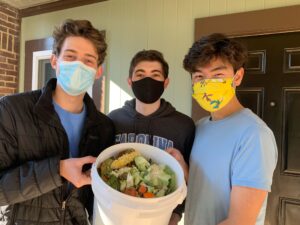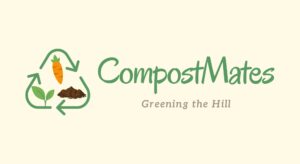Welcome to CompostMates
Our Mission

CompostMates at Carolina primarily serves to expand access to composting among off-campus UNC-CH students who lack the ability to donate or maintain their own compost. In doing so, CompostMates achieves lower methane gas production in landfills through the diversion of organic waste. CompostMates facilitates this mission through a free pick up service of food scraps.
CompostMates secondarily serves to instill sustainable and environmentally-conscious practices into its members, volunteers, and broader community. Additionally, CompostMates supports local organizations, including community gardens, with their missions through advocacy, publicity, and food scrap donations.
Why Compost?
Lower Methane Gas EmissionsAccording to the EPA, food scraps in landfills produce methane, which is a greenhouse gas that is 28 to 36 times more effective than carbon at trapping heat in the atmosphere over a 100-year period. In fact, landfills account for 1/3 of human-related methane emissions in the United States. In addition to expediting climate change, landfill gas has negative health impacts. Landfill gas, mostly composed of methane and carbon dioxide, puts nearby communities at higher risk of serious cancers and lung diseases. |
Beat the LandfillA 2018 EPA study found that food waste accounted for 24.1% of all waste in landfills. Instead of expanding already giant landfills, composting enables us to scale down landfills and scale up environmental stewardship. By minimizing landfill space we can decrease their visual, odor, and health nuisance which drives down surrounding property values. As composting and other circular waste policies become more popular, we can eventually beat the landfill and use this space differently. |
Soil Nourishment Supporting Local AgricultureCompost is decayed organic material that is nutrient-rich. It is an excellent soil and plant fertilizer. Seeing that it comes from discarded food, composting allows community gardens a low-cost and efficient way to nourish soil. CompostMates partners with local gardens that combat food insecurity and strengthen local food systems.
|
Environmental JusticeComposting has broad implications on climate change, environmental health, community investment, and local agriculture. We must not forget that landfills are mostly located within and near low-income communities, and people of color comprise over half of those who live within two miles of these waste sites. This reality gives low-income communities the greatest environmental burden, despite resounding research showing that they contribute the least to such burdens. Moreover, redlining has an intractable impact on the racial segregation of environmental hardships, so we have a social imperative to disrupt our unjust waste management system. |
Our Impact
Since CompostMates started our pickup service, we have diverted 4420 pounds of food waste from going into landfills. That’s the equivalent of saving 3509 pounds of carbon dioxide and 366 pounds of methane from entering the atmosphere! This is important because carbon dioxide and methane are greenhouse gases, which when emitted in large amounts into the atmosphere (through activities like driving a gasoline car) can cause irreversible damage to global climate patterns.
Our Vision
CompostMates strives to attain shared responsibility for the climate crisis with the larger Chapel Hill community. We believe that increased accessibility to food scrap collection services, education, and advocacy can foster community ownership of climate action.
